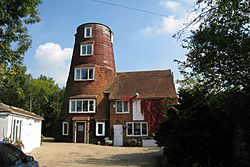Walter's Mill, Mark Cross facts for kids
Quick facts for kids Mark Cross Windmill |
|
|---|---|

The converted mill
|
|
| Origin | |
| Mill name | Walter's mill |
| Mill location | TQ 585 315 |
| Coordinates | 51°03′40″N 0°15′36″E / 51.061°N 0.260°E |
| Operator(s) | Private |
| Year built | c1845 |
| Information | |
| Purpose | Corn mill |
| Type | Tower mill |
| Storeys | Five storeys |
| No. of sails | Four sails |
| Type of sails | Patent sails |
| Winding | Fantail |
| Auxiliary power | Gas engine |
| No. of pairs of millstones | Two pairs |
Walter's Mill is a tall tower mill found in Mark Cross, Sussex, England. This historic building, once used for grinding corn, has now been changed into a home. It stands as a reminder of how windmills used to work long ago.
The Story of Walter's Mill
Walter's Mill was first mentioned in records around 1845. People believe it was built by the Arnold brothers from Paddock Wood, Kent. The mill used wind power to grind corn for many years.
However, on July 26, 1911, a fire badly damaged the mill. After the fire, it was repaired and started working again. This time, it used a Gas engine instead of wind. The top part of the mill, called the cap, used to have a special "crenellated" design, which looked like the top of a castle wall. This part was removed in the early 1930s.
In 1962, the mill building was changed and made bigger to become a house. In 2005, the owners shared plans to rebuild the cap and the large sails. Their long-term goal is to make the mill look like it did in its original working days.
What Walter's Mill Looks Like
Walter's Mill is a five-storey tower mill. This means it has five levels and is built from brick. The outside is covered with tiles. When it was working, it had four special "Patent sails". These sails could adjust themselves automatically to catch the wind.
The top part of the mill, called the cap, was turned by a "fantail". A fantail is a small windmill at the back of the cap that automatically turns the main sails into the wind. Inside, the mill used two pairs of "millstones" to grind corn. These millstones were "underdrift," meaning they were driven from below.
Today, the converted tower still stands. The windows and doors were made larger when the mill was turned into a house.
People Who Worked at the Mill
Many people worked as millers at Walter's Mill over the years. Here are some of them:
- Catherine Ashby (1845)
- Walter Dunk (1855 - 1856)
- Edward J Walter and Sons (1887)
- Edward and Joseph Walter (1903)
- Joseph Walter and Son (1905)
- Joseph Walter and Sons (1913)
- Wealden Farmers Ltd (1930s)
 | Emma Amos |
 | Edward Mitchell Bannister |
 | Larry D. Alexander |
 | Ernie Barnes |

